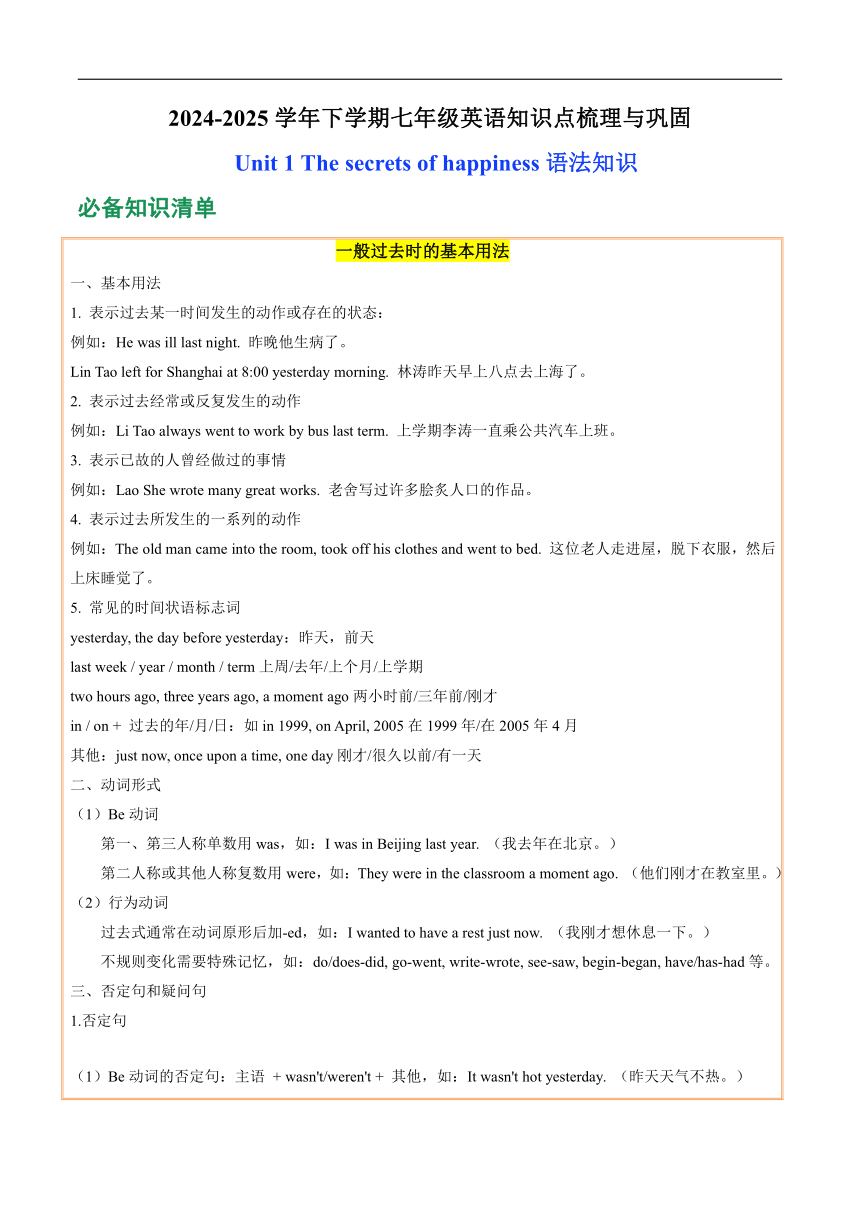
2024-2025学年下学期七年级英语知识点梳理与巩固 Unit 1 The secrets of happiness语法知识 必备知识清单 一般过去时的基本用法 一、基本用法 1. 表示过去某一时间发生的动作或存在的状态 : 例如:He was ill last night. 昨晚他生病了。 Lin Tao left for Shanghai at 8:00 yesterday morning. 林涛昨天早上八点去上海了。 2. 表示过去经常或反复发生的动作 例如:Li Tao always went to work by bus last term. 上学期李涛一直乘公共汽车上班。 3. 表示已故的人曾经做过的事情 例如:Lao She wrote many great works. 老舍写过许多脍炙人口的作品。 4. 表示过去所发生的一系列的动作 例如:The old man came into the room, took off his clothes and went to bed. 这位老人走进屋,脱下衣服,然后上床睡觉了。 5. 常见的时间状语标志词 yesterday, the day before yesterday :昨天,前天 last week / year / month / term上周/去年/上个月/上学期 two hours ago, three years ago, a moment ago两小时前/三年前/刚才 in / on + 过去的年/月/日 :如in 1999, on April, 2005在1999年/在2005年4月 其他 :just now, once upon a time, one day刚才/很久以前/有一天 二、动词形式 (1) Be动词 第一、第三人称单数用was,如:I was in Beijing last year. (我去年在北京。) 第二人称或其他人称复数用were,如:They were in the classroom a moment ago. (他们刚才在教室里。) (2) 行为动词 过去式通常在动词原形后加-ed,如:I wanted to have a rest just now. (我刚才想休息一下。) 不规则变化需要特殊记忆,如:do/does-did, go-went, write-wrote, see-saw, begin-began, have/has-had等。 三、否定句和疑问句 1. 否定句 (1)Be动词的否定句:主语 + wasn't/weren't + 其他,如:It wasn't hot yesterday. (昨天天气不热。) (2)行为动词的否定句:主语 + didn't + 动词原形 + 其他,如:He didn't go to school yesterday. (他昨天没有去上学。) 2. 一般疑问句 (1)Be动词的一般疑问句:Was/Were + 主语 + 其他?如:Were you in Beijing last month (你上个月在北京吗?) (2)行为动词的一般疑问句:Did + 主语 + 动词原形 + 其他?如:Did your mother work in this factory three years ago (你妈妈三年前在这个工厂工作吗?) 3. 特殊疑问句 结构 :特殊疑问词 + 一般疑问句开头 + 其他。如:Where were you last night (你昨晚在哪里?) 核心知识回顾 一般过去时的特殊用法 1. 表示过去经常发生的动作或行为 通常与副词always、often、usually、sometimes等连用。这种用法常用于描写人物性格、爱好、习惯等。例如: When I was a child, I always played football with my friends. 小时候,我经常和朋友们踢足球。 2. 表示过去习惯性的动作或行为 通常与used to或would连用。例如: He used to smoke.他过去常常抽烟。 He would go fishing every weekend.他过去每个周末都去钓鱼。 3. 表示与现在事实相反的假设或愿望 在某些条件句宾语从句中,用一般过去时表示与现在事实相反的假设或愿望。例如: If I had money, I would buy a car.如果我有钱,我就会买车。 I wish I knew the answer.我希望我知道答案。 4. 与过去完成时连用 表示在过去某个时间点之前已经完成的动作或状态。这种用法常用于对比过去完成的动作或状态。例如: By the time I arrived at the party, everyone had already left.等我到的时候,大家都已经走了。 5. 表示虚拟语气 用于表达与现实情况相反的假设或愿望。这种用法常与情态动词could、would、should等连用。例如: If I had known you were coming, I would ... ...
~~ 您好,已阅读到文档的结尾了 ~~

